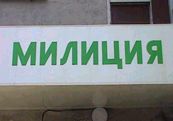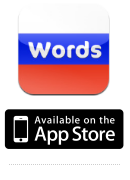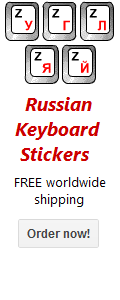| FR | About us | Home | User agreement | Link to us |
Making Comparisons in Russian
In English, comparisons are formed with the help of the ending -er or the words more and less. This is almost the same in Russian where you can use the ending -ee and the words более (more) and менее (less) in combination with adjectives. For example:
Я хочу послушать более популярную песню.
(I want to listen to a more popular song.)Игра стала менее интересной.
(The game became less interesting.)
In order to make a comparison use the word более or менее before and adjective followed by a noun. Thus, the basic rule of comparison in Russian will be:
|
более/менее + adjective + noun |
However, this rule will not work with such adjectives as больший (bigger), меньший (lesser), лучший (better) худший (worse) and some others. These adjectives can be used to make comparisons on their own and you should try to memorize them. Here are some examples:
Проблема приняла большее значение.
The problem has become more important.
(literally: The problem took bigger importance.)Стив купил арбуз за меньшую цену, чем Ольга.
Steve bought a water-melon for a less price than Olga did.
You can also form comparisons by adding the ending -ee to the stem of an adjective. Here is the rule to follow:
|
Adjective stem + ee |
And, again, this rule will not work for so called "irregular short adjectives". The most common of such irregular short adjectives are summed up in the table and you will have to memorize them.
| Irregular short adjectives | |
| большой (big) |
больше (bigger) |
| высокий (tall) |
выше (taller) |
| дорогой (expensive) |
дороже (more expensive) |
| молодой (young) |
моложе (younger) |
| плохой (bad) |
хуже (worse) |
| маленький (small) |
меньше (smaller) |
| хороший (good) |
лучше (better) |
| чистый (clean) |
чище (cleaner) |
We would also recommend you to learn two more words which are often used when making comparisons in Russian. The first one is чем (than).
The word чем is used to compare two things or people. If you are just smattering Russian, use the word чем with более/менее as this is shown in the example. Do not forget that gender and number of the adjective must agree with the noun!
Моя книга более интересная, чем твоя книга.
(My book is more interesting than your book.)
here the adjective интересная agrees with feminine singular noun книга
However, if you are fluent with short ajectives you can make shorter comparisons (without the word более), as this example shows:
Моя книга интереснее, чем твоя.
(My book is more interesting than yours.)
here интереснее is a short adjective
The second phrase useful when making comparisons is как можно... (as ... as ...). It is used with short adjectives only. Here are two examples to study:
Сделайте это как можно скорее.
(Do it as soon as possible.)Мы говорили как можно тише.
(We were speaking as soft as possible.)
Got questions?
Ask them in the Russian Questions and Answers — a place for students, teachers and native Russian speakers to discuss Russian grammar, vocabulary, pronunciation, and other aspects of the Russian language.
Copyright 2001-20252025 MasterRussian.com | Privacy Policy | Contact Us
 Russian Lessons
Russian Lessons
- Russian alphabet
- Names of letters
- Russian Q&A new
- Pronunciation: Cons.
- Pronunciation: Vowels
- Noun Gender/Number
- Cases of Nouns
- Russian Greetings
- Personal Pronouns
- Learning Russian
- 1000 Common Words
- 500 Russian Verbs
- Top Russian Nouns
- » All lessons
- » Guest lessons
 Browse Topics
Browse Topics
- Start learning Russian
- Forum
- Bookstore
- Dictionaries
- Russian - basic
- Russian - adv
- Pronunciation
- Russian Blog new
- Reading
- Test & quizzes
- Translation
- Verbs
- Verb Conjugations
- Russian numbers
- Russian Tests new
- Vocabulary
- Writing
- Folk music
- Fun stuff
- Leo Tolstoy
- Learner's lore
- Literature
- Personal blogs
- Picture Dictionary new
- Proverbs
- Publications
- Radio & TV
- Russian culture
- Schools in Russia
- Russian Words
- Russian names
- Software
- Russian Words iPhone

Search MasterRussian

English » Russian dictionary

WORD OF THE DAY
![]() RSS
|
iGoogle
|
My Yahoo!
RSS
|
iGoogle
|
My Yahoo!
Meaning: to tell, narrate, recite
Pronunciation: [rahs-KAH-zih-vuht']
Learn Russian words more... »
TODAY'S STREET SIGN

Russian: Милиция
English: Militsia (police)
FOLLOW US ON TWITTER

MasterRussian on Twitter


